CLAS 357
matrona
February 7, 2024
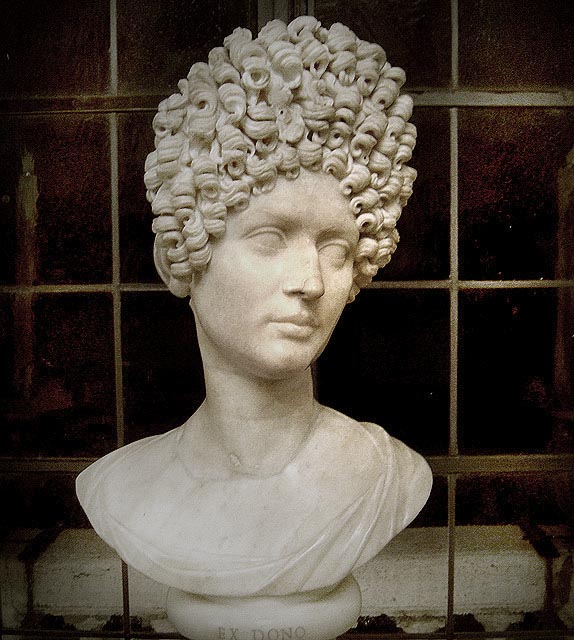
Flavian elite matrona (80-90 CE)
Response #1 Topics (due tonight, 11:59pm in D2L)
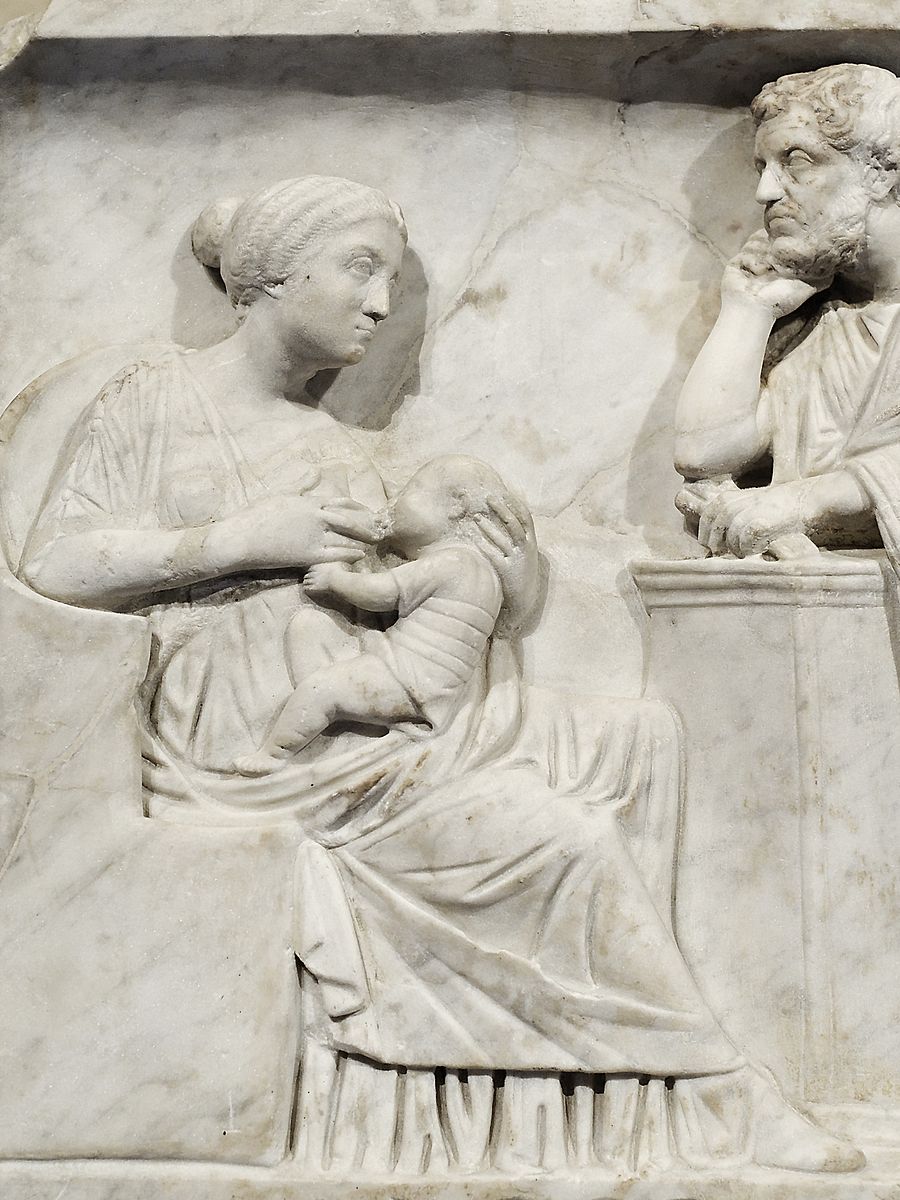
Sarcophagus of Marcus Cornelius Statius (150 BCE)
“Visitor, what is written here is brief—stop and read it through.
This is the unattractive tomb of an attractive woman.
Her parents called her Claudia
She loved her own husband with her whole heart.
She bore two sons and leaves one of them
On the earth, and she placed the other beneath it.
She was charming in conversation; but proper in her manner.
She kept the house. She made wool. I've spoken. Go along.” (CIL I.2.1211, 2nd century BCE)
Matrona: traditional elite ideals
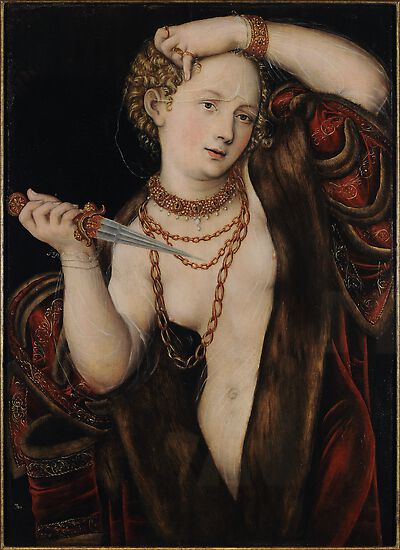
Lucas Cranach, Lucretia (ca. 1530)
- Sabine women: Rome's civic myth of incorporating women into state & patriarchal family at beginning of monarchy; women's social roles in terms of relationships to men (cf. naming after father's gens, e.g. daughter of Marcus Tullius Cicero =Tullia)
Livy 1.9 (King Romulus urges Sabine women to accept their circumstances)
Romulus repeatedly went around in person to visit them, arguing that what had occurred was due to arrogance from their parents, who had refused intermarriage with their neighbours. Despite this, he promised that they would enjoy the full rights of a proper marriage, becoming partners in all the fortunes couples might share, in Rome's citizenship, and in the begetting of children, the object nearest to every person's heart. So let them now abate their anger, let them give their hearts to those to whom chance had given their bodies. In fact, their husbands would be even more solicitous than they might expect, because each one would do his utmost both to be a good husband and to fill the void created by the loss of parents and country.
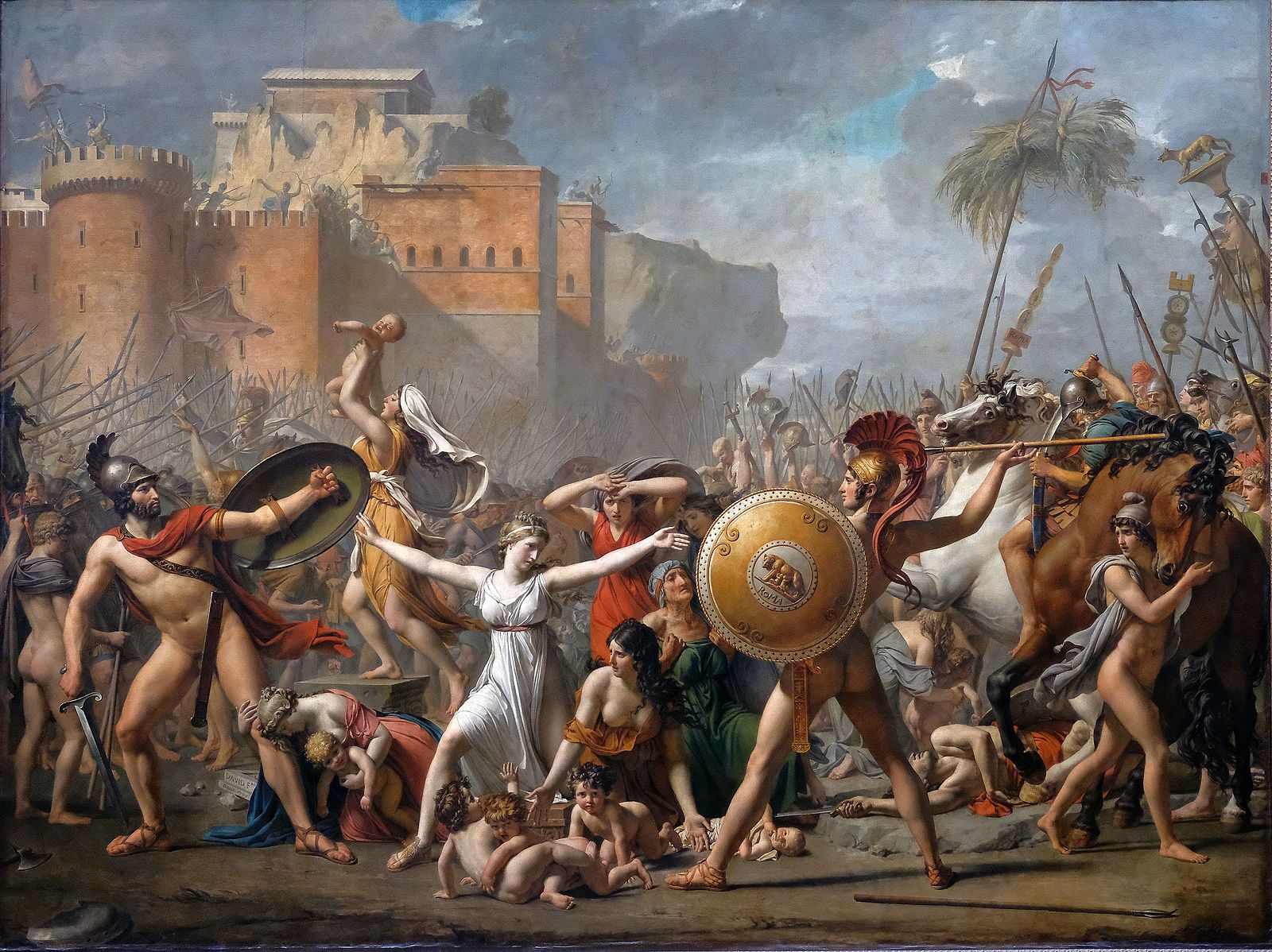
David, The Intervention of the Sabine Women (1799)
Livy 1.13 (the Sabine women stop the battle)
It was at this moment that the Sabine women, whose abduction had caused the war, boldly interposed themselves amid the flying spears. Their misfortunes overcame womanish fear: with hair streaming and garments rent, they made a mad rush from the sidelines, parting the battling armies and checking their angry strife. Appealing to fathers on one side and husbands on the other, they declared that kin by marriage should not defile themselves with impious carnage, nor leave the stain of blood upon descendants of their blood, grandfathers upon grandsons, fathers upon children. "If you cannot abide the ties between you that our marriage has created, turn your anger against us. We are the cause of the war, we the cause of husbands and fathers lying wounded and slain. Only one side can win this fight. As for us, it is better to die than to live, for we must do so either as widows or orphans." Their appeal moved both leaders and the rank and file: silence and a sudden hush fell upon the field.
- women's sacrifice of bodies > political & domestic order ("Henceforth the two kings ruled jointly and in harmony", 1.13); cf. use of women (marriage, divorce) to secure alliances between powerful Republican families
- Lucretia: model matrona at beginning of Republic; rape by Sextus Tarquinius, son of Tarquin the Proud (last king); sacrifice of woman's body to greater cause of body politic
Livy 1.58 (Tarquin's threat)
When he saw she was resolute and would not yield even out of fear for her life, he threatened to disgrace her even in death by placing the naked body of a murdered slave next to her corpse, evidence that she had been committing adultery of the basest sort.
Livy 1.58 (Lucretia reveals rape to her father and husband)
"What can be right when a woman's virtue has been taken from her? The impress of another man is in your bed, Collatinus; yet only my body was defiled; my soul is not guilty. Death will be my witness to this . . ." [Lucretia secures a guarantee of revenge from all present] ". . . It is up to you", she said, "to punish this man as he deserves. As for me, I absolve myself of wrong, but not from punishment. Let no unchaste woman hereafter continue to live because of the precedent of Lucretia." She took a knife she was hiding in her garments and drove it into her breast. Doubling over, she collapsed in death.
- Arria (Pliny, Letters 3.16, ca. 100 CE): famously inspires husband Paetus (imprisoned by Claudius, 42 CE) to commit suicide ("Paetus, it does not hurt"); earlier efforts, "I told you that I would find some harsh way to die if you refused me an easy one", concealment of son's death
[cf. Martial, Epigrams 1.13: "When the chaste Arria handed to her Paetus the sword which she had with her own hand drawn forth from her heart, "If you believe me," said she, "the wound which I have made gives me no pain; but it is that which you will make that pains me."]
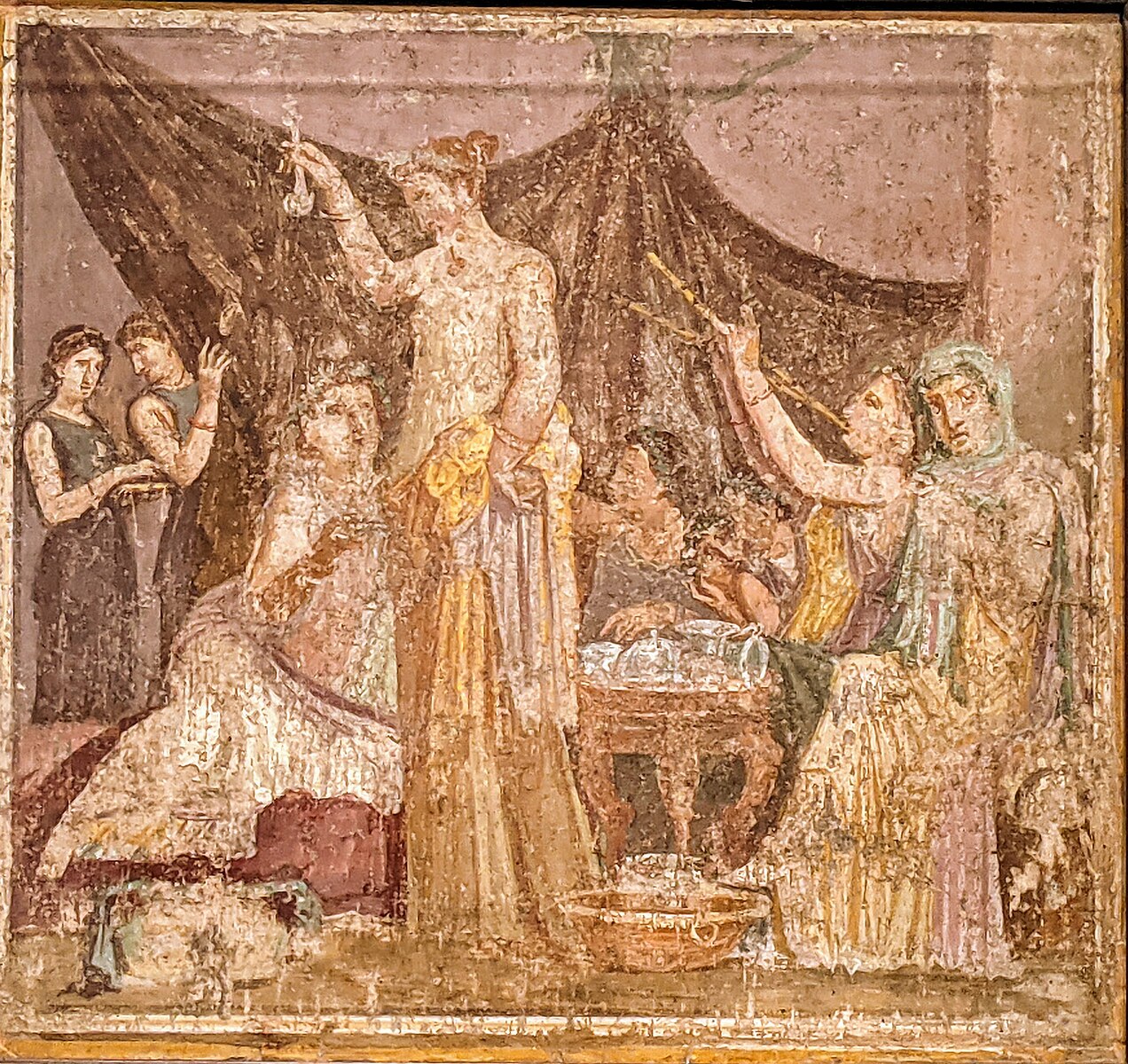
Fresco of women's dinner party with music (Pompeii, 1st century CE)
Women's life: legal & social factors
- Roman matrona (= uxor, "wife"): materfamilias not legally parallel concept (to paterfamilias), context of sexual virtue & honorable character (cf. Adelphoe 747, meretrix et materfamilias una in domo?)
- purpose of Roman marriage: liberorum quaerundorum causa ("for the purpose of obtaining legitimate children") + legal, economic, social, emotional purposes (personal support, harmony and mutual happiness emphasized in epitaphs)
- marriage cum manu ("with transfer of power") vs. sine manu ("without transfer of power"): sine manu becomes norm (Second Punic War+); matrona remains filiafamilias, controls property, can initiate divorce
- dowry: returned upon divorce, never fully husband's despite legal ownership; stereotype of empowered "dowered wife" (uxor dotata)
- elite women: possibility of independent ownership of land, property, finances, businesses, estates, slaves; freedmen; inheritance & wills; appearance in court
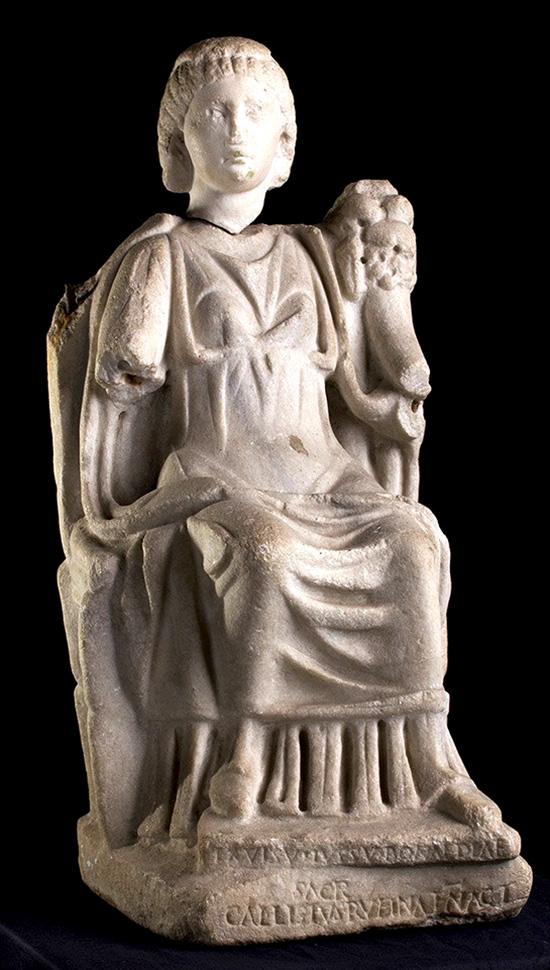
Marble statue of Bona Dea
- citizens without full political rights (limited formal public life): Vestal Virgins, women's religious festivals
- other social practices: arranging marriage of children, (consent of both parents); dinner parties, public baths
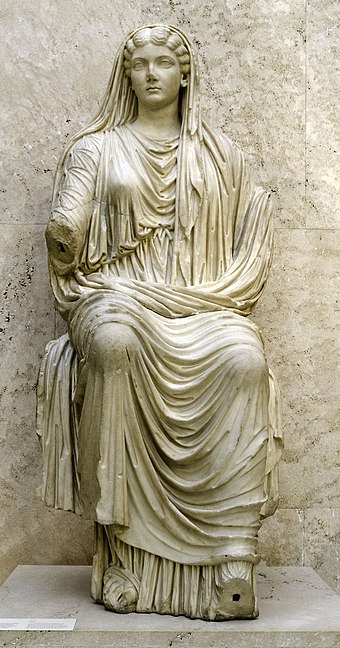
Livia Drusilla (59 BCE-29 CE), wife of Augustus, in stola
- exceptionally influential elite women: Clodia, Fulvia (wife of Mark Antony), Agrippina (mother of Nero), et al.
"Laudatio Turiae" (ILS 8393): complex realties of an elite Republican woman's life (not Turia, wife of Quintus Lucretius Vespillo); funeral epitaph; (anonymous) wife's various acts of virtus ("lit. "manliness") during civil wars (late Republic > Empire); 40 years marriage
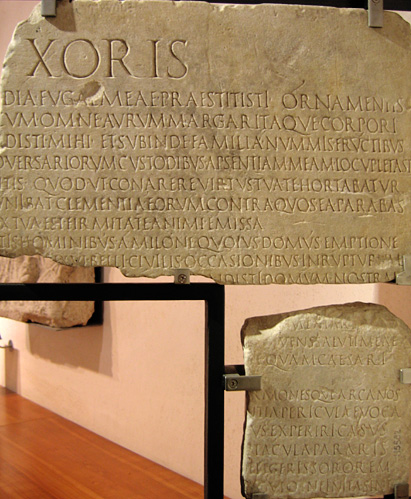
Fragment of Laudatio Turiae
- personal "domestic" qualities (esp. pietas, e.g. dowries for female relatives)
Left column 30-37
Why should I mention your domestic virtues: your loyalty, obedience, affability, reasonableness, industry in working wool, religion without superstition, sobriety of attire, modesty of appearance? Why dwell on your love for your relatives, your devotion to your family? You have shown the same attention to my mother as you did to your own parents, and have taken care to secure an equally peaceful life for her as you did for your own people, and you have innumerable other merits in common with all married women who care for their good name. It is your own virtues that I am asserting, and very few women have encountered comparable circumstances to make them endure such sufferings and perform such deeds. Providentially, Fate has made such hard tests rare for women.
- extraordinary public acts: parents' murder (vengeance, father's property) during husband's absence, defense of home
Right column 11-18 (proscriptions of Second Triumvirate of Octavian, Antony, Lepidus)
But I must say that the bitterest thing that happened to me in my life befell me through what happened to you. When thanks to the kindness and judgment of the absent Caesar Augustus I had been restored to my country as a citizen, Marcus Lepidus, his colleague, who was present was confronted with your request concerning my recall, and you lay prostrate at his feet, and you were not only raised up but were dragged away and carried off brutally like a slave. But although your body was full of bruises, your spirit was unbroken and you kept reminding him of Caesar's edict with its expression of pleasure at my reinstatement, and although you had to listen to insulting words and suffer cruel wounds, you pronounced the words of the edict in a loud voice, so that it should be known who was the cause of my deadly perils. The matter was soon to prove harmful for him.
- mutual (?) devotion of spouses
Right column 31-43
When you despaired of your ability to bear children and grieved over my childlessness, you became anxious lest by retaining you in marriage I might lose all hope of having children and be distressed for that reason. So you proposed a divorce outright and offered to yield our house free to another woman's fertility. Your intention was in fact that you yourself, relying on our well-known conformity of sentiment, would search out and provide for me a wife who was worthy and suitable for me, and you declared that you would regard future children as joint and as though your own, and that you would effect a separation of our property which had hitherto been held in common, but that it would still be under my control and, if I wished so, under your administration: nothing would be kept apart by you, nothing separate, and you would thereafter take upon yourself the duties and the loyalty of a sister and a mother-in-law.
I must admit that I flared up so that I almost lost control of myself; so horrified was I by what you tried to do that I found it difficult to retrieve my composure. To think that separation should be considered between us before fate had so ordained, to think that you had been able to conceive in your mind the idea that you might cease to be my wife while I was still alive, although you have been utterly faiuthful to me when I was exiled and practically dead!
- husband's pledge to respect final wishes ("You bequeathed me sorrow through my longing for you and left me a miserable man without children to comfort me. I on my part will, however, bend my way of thinking and feeling to your judgements and be guided by your admonitions", right column 54-5)
Some Images of Women's Lives
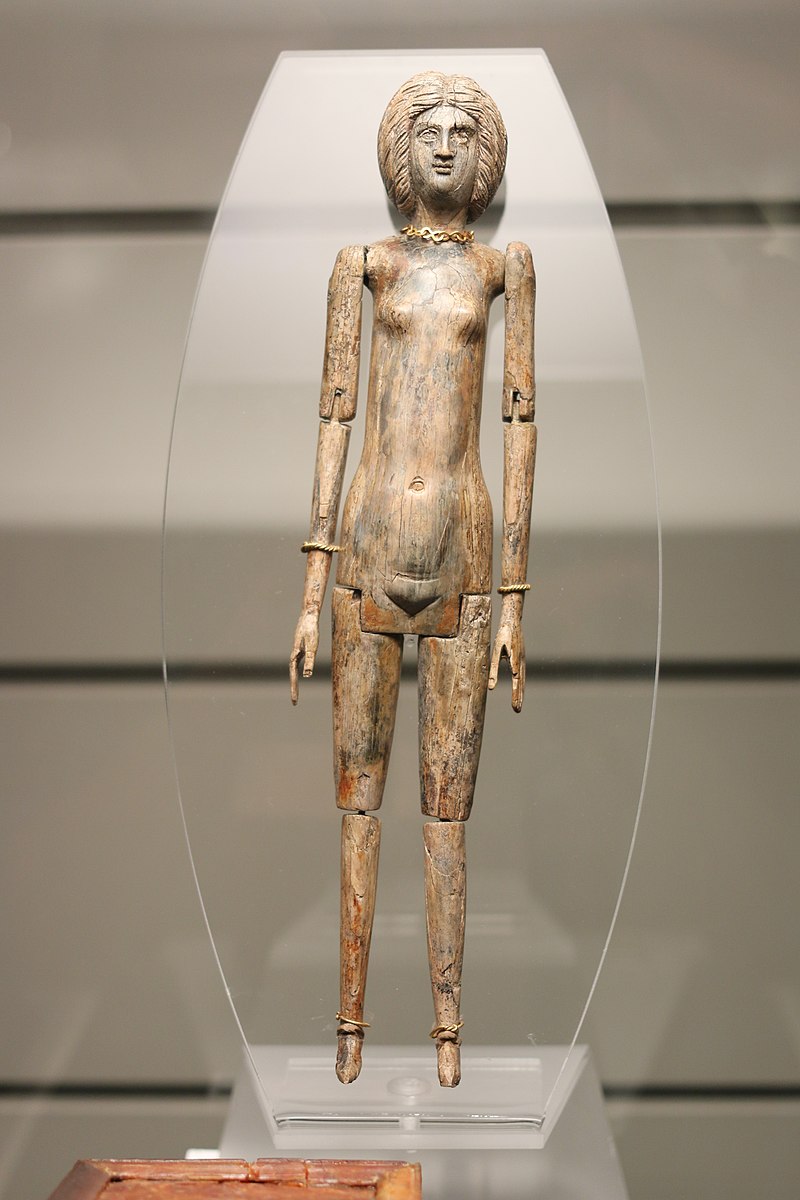
Articulated ivory doll (3rd century CE)
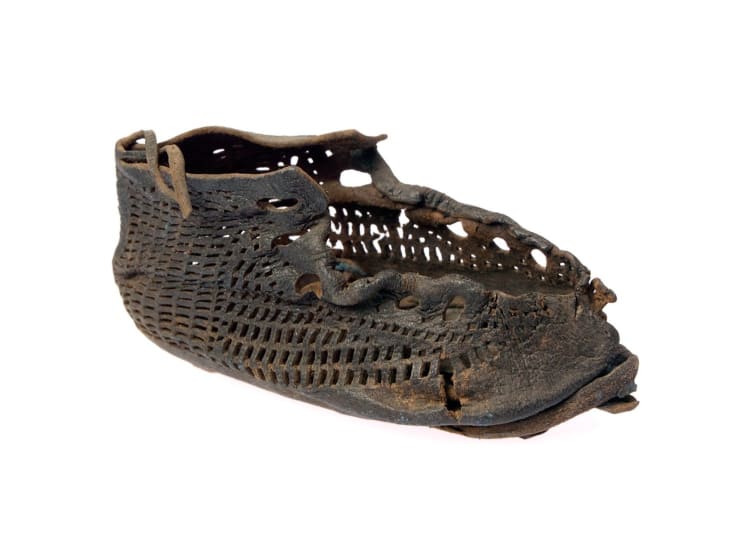
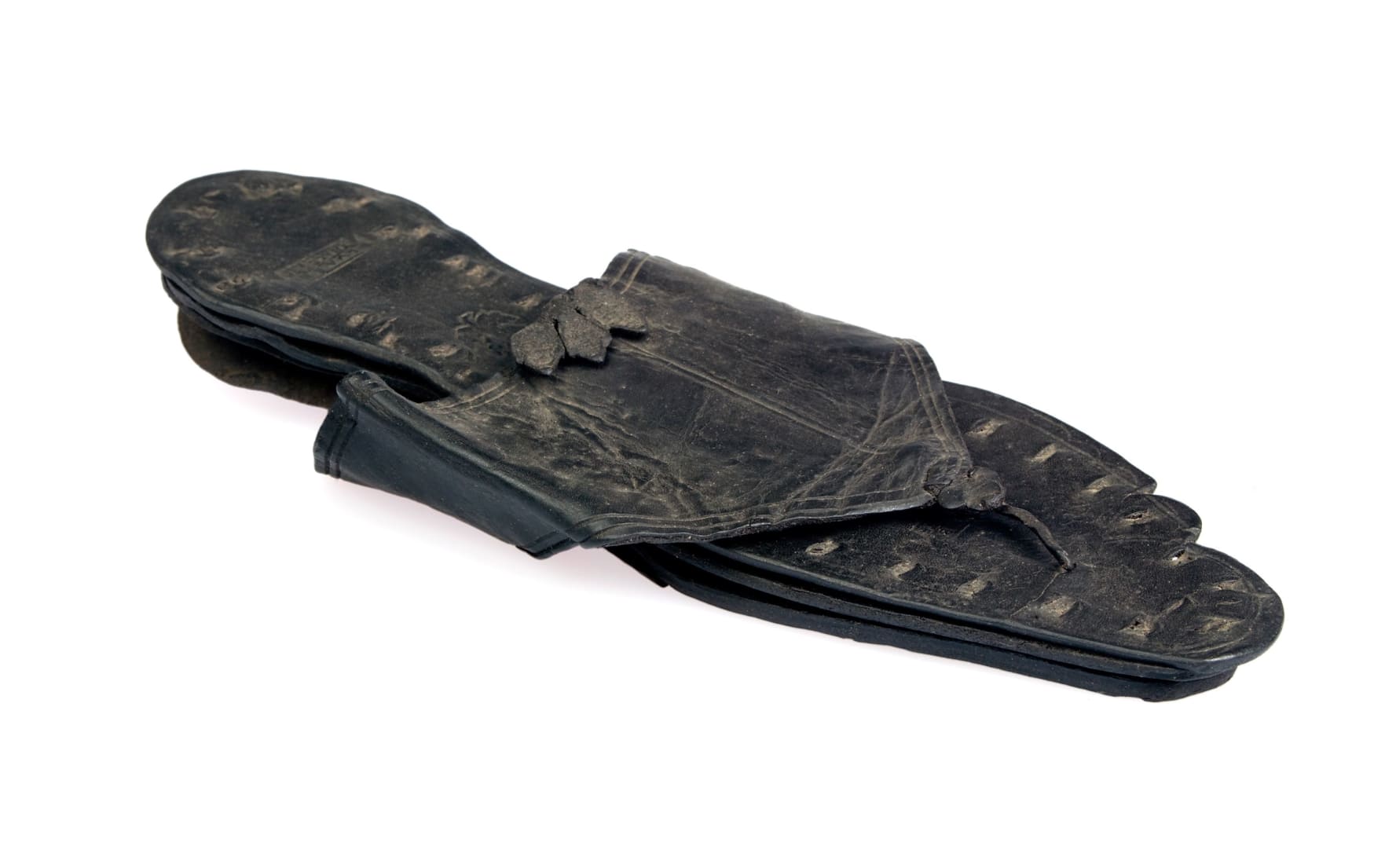
Baby's boot and woman's slipper (Vindolanda, England)
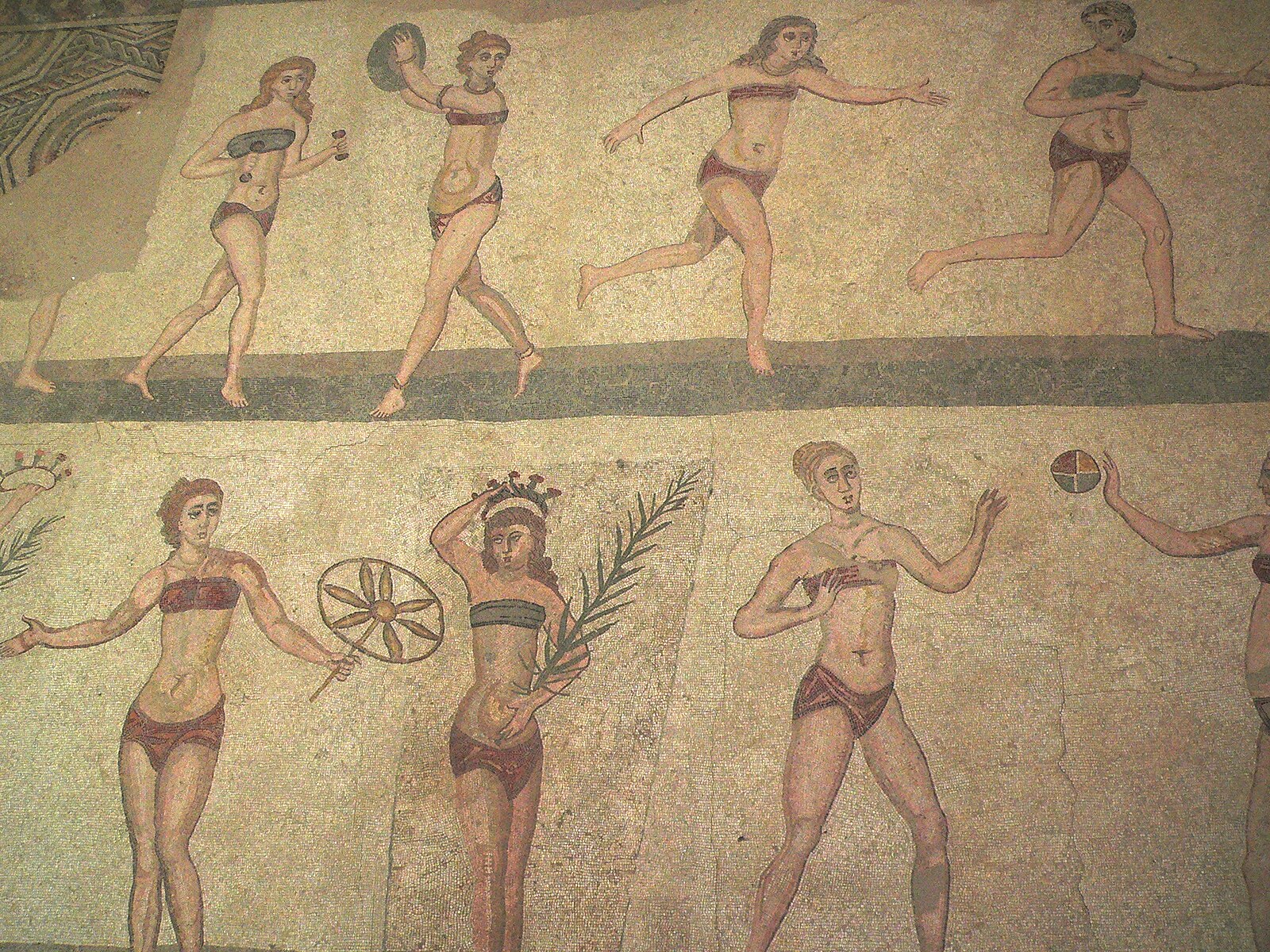
Young female athletes mosaic (Piazza Armerina, Sicily, early 4th CE)
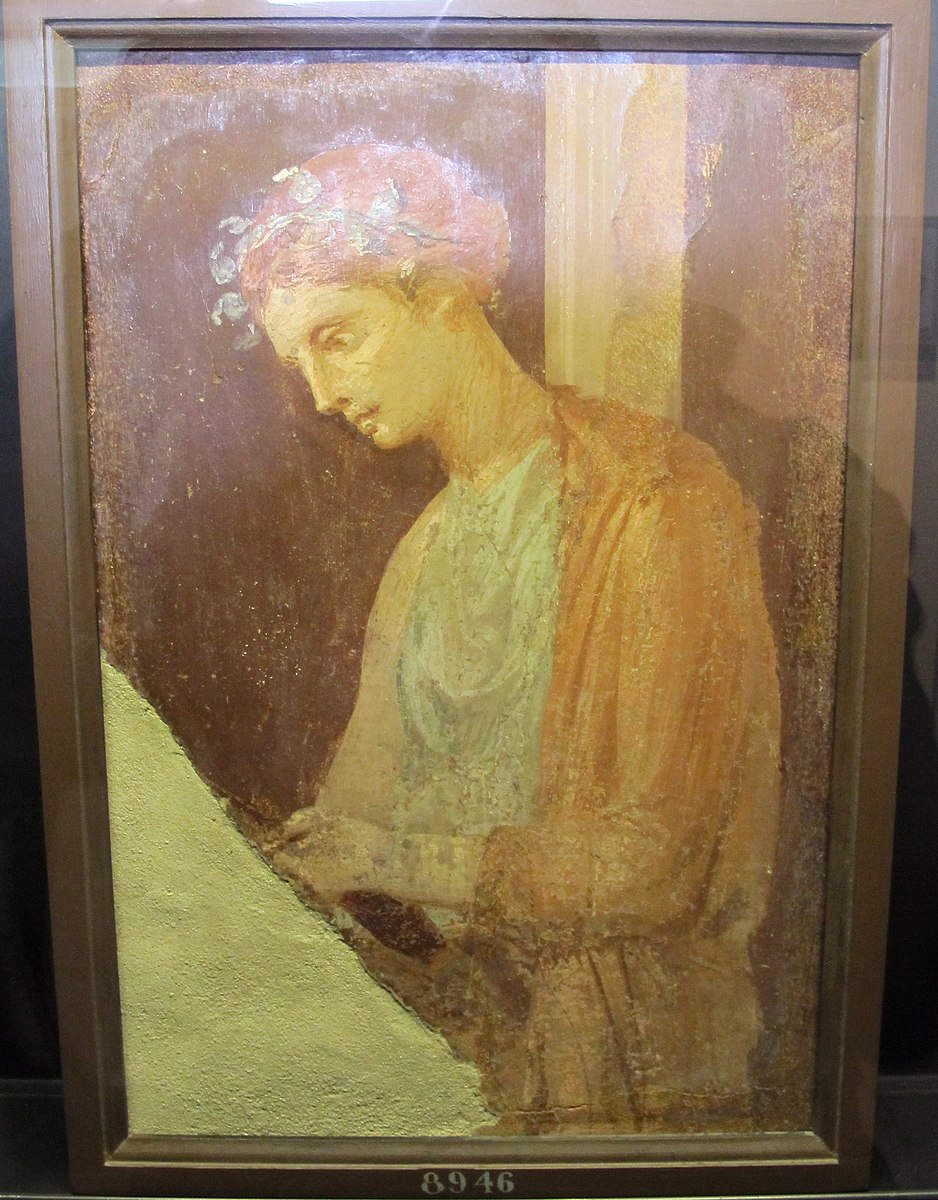
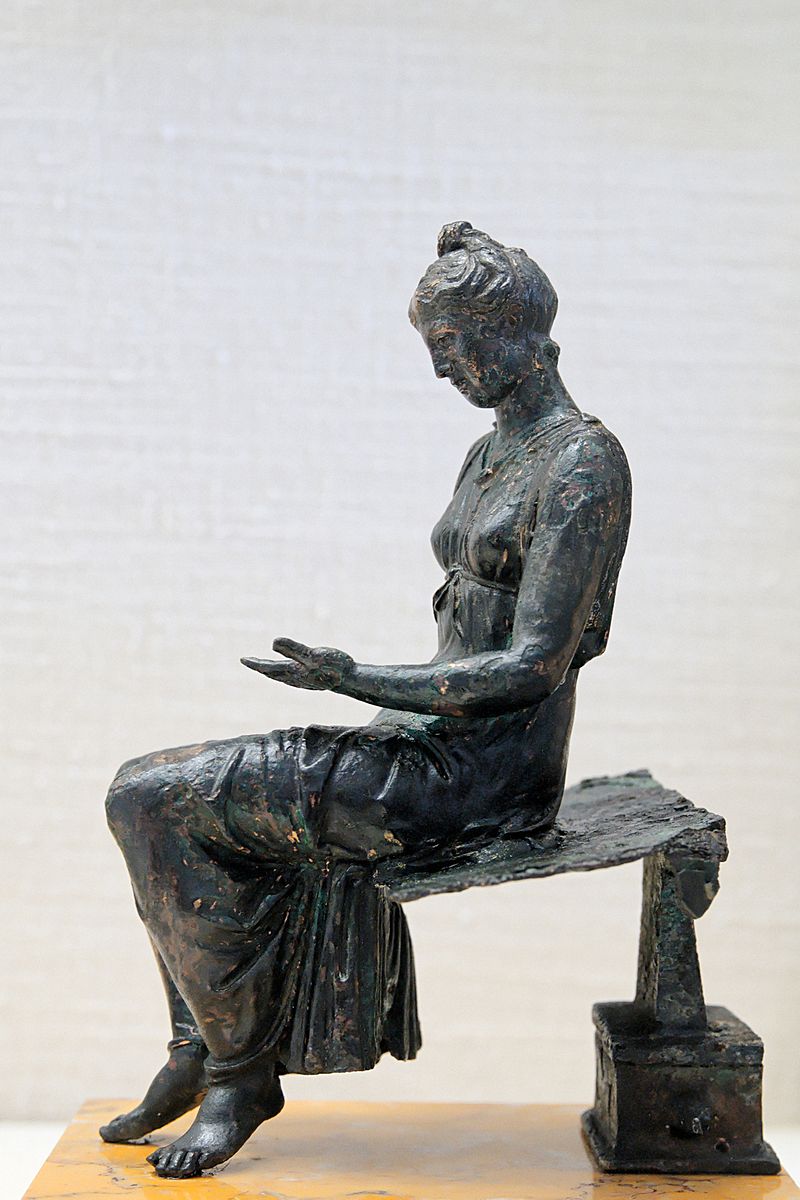
L: Young female reading (Pompeii, 1st century CE): R: Bronze statue of young female reading (1st century CE)
_her_hair,_from_the_Villa_of_Arianna_at_Stabiae_(Castellammare_di_Stabia),_Naples_National_Archaeological_Museum_(17392924485).jpg)
Fresco of woman & mirror (Stabiae, 1st century CE)
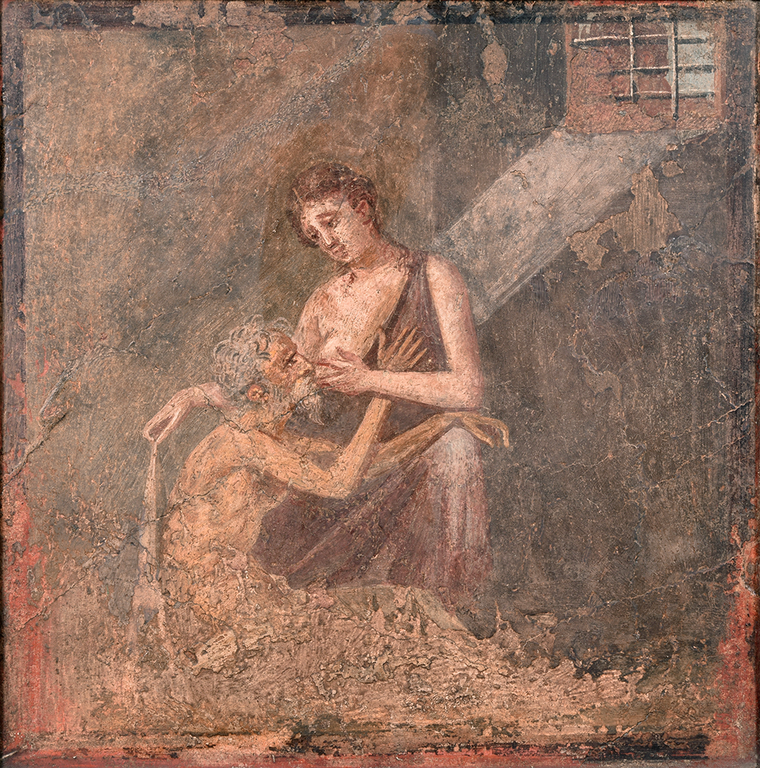
Pero & Cimon fresco (Pompeii, 1st century CE)
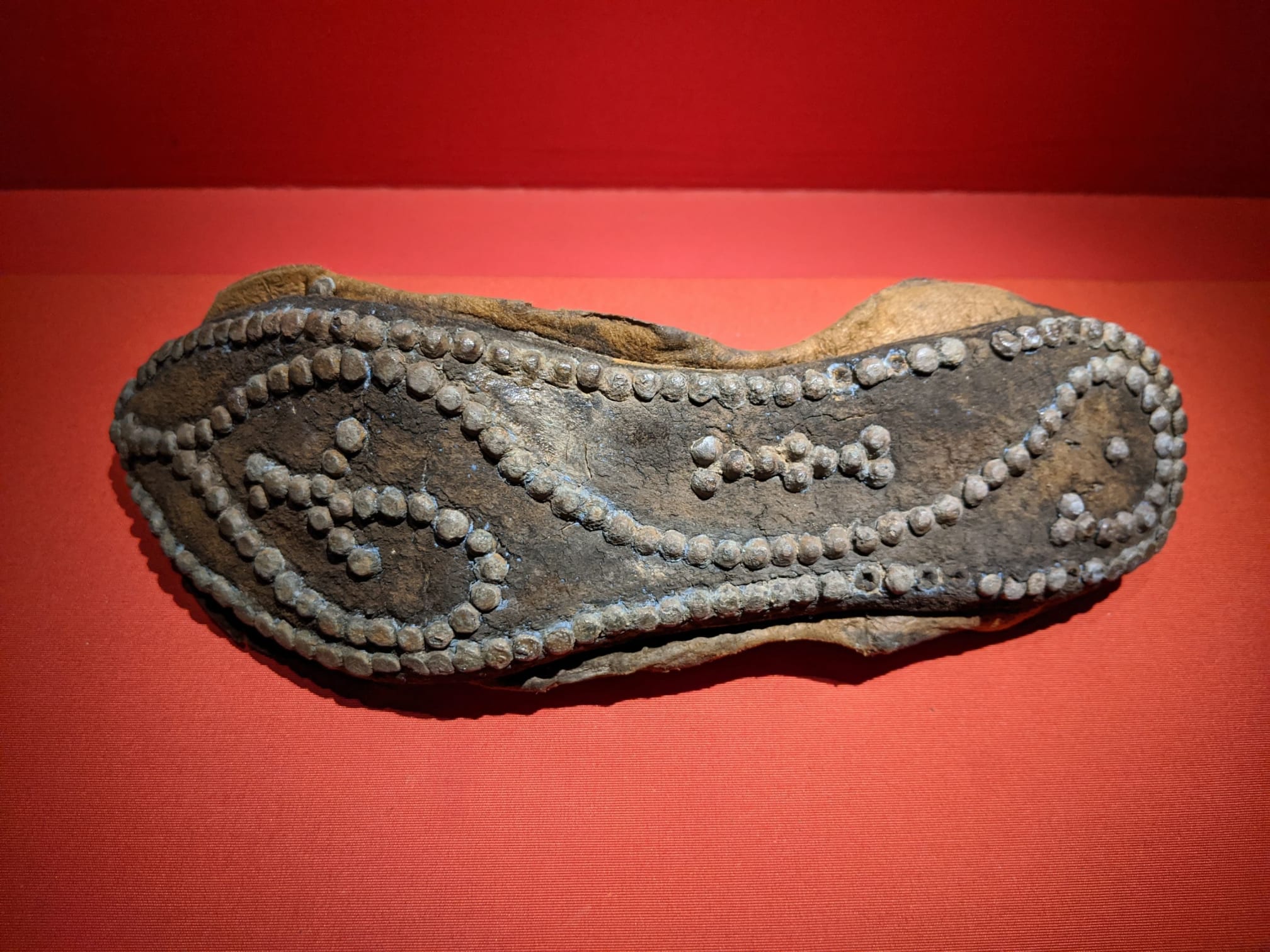
Woman's shoe (Vindolanda, England)















_her_hair,_from_the_Villa_of_Arianna_at_Stabiae_(Castellammare_di_Stabia),_Naples_National_Archaeological_Museum_(17392924485).jpg)

